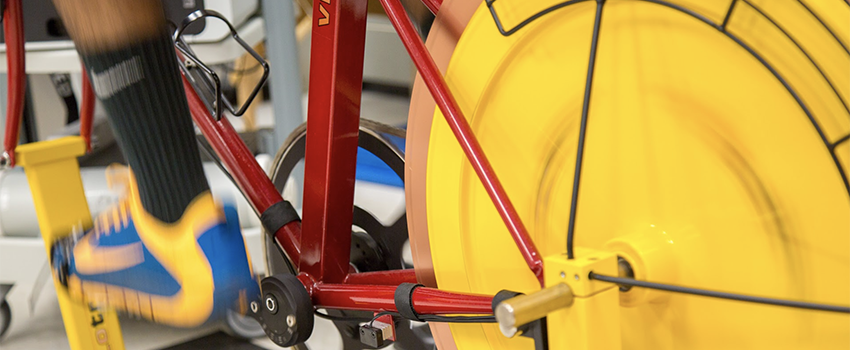Exercise Science M.S.

The Master of Science in Exercise Science graduate program offers a broad course of study to allow students the opportunity to prepare for a career in exercise science that is tailored to their specific interests. Students can personalize their degree track and course selections to prepare for careers in a variety of settings, such as sports performance, strength and conditioning, cardiopulmonary rehabilitation, wellness and fitness, and sports science research. This graduate degree requires students to complete a minimum of 30 hours of academic coursework. Most classes are scheduled at night to allow flexibility with current employment and internship opportunities. The program allows students to select from three degree track options:
Careers in Exercise Science
What can I do with a degree in exercise science?
- Exercise physiologist
- Clinical exercise physiologist
- Wellness director
- Strength and conditioning coach
- Sports performance specialist
- Personal fitness trainer
- Recreation director
- Research
- Preparation for professional school in various health-related fields including physical therapy, occupational therapy, medicine, pharmacy, etc.
- Small class sizes allow for individualized attention and experiential learning opportunities
- State-of-the-art exercise testing equipment
- Courses taught by accomplished exercise science researchers
- Opportunities to assist with research and data collection
- Potential for qualified students to lead a research study
- Established relationships with many local facilities to support internship opportunities
- Non-thesis track can be completed in one year
- Most classes are scheduled at night to allow flexibility with current employment
The Health, Kinesiology, and Sport Department contains multiple laboratories for teaching and research purposes. These laboratories contain the necessary equipment to perform all the classical physiological measurements during exercise including two COSMED metabolic carts for cardiopulmonary/ECG exercise testing, treadmills and several cycle ergometers for aerobic exercise testing, a HUMAC NORM Isokinetic Dynamometer, an AMTI™ force plate designed to measure forces and moments used in research and clinical studies looking at balance, gait, and sports performance. The labs are equipped with a state-of-the-art Hologic™ dual x-ray absorptiometer (DXA), COSMED BodPod, Fit3D body scanner, bioelectrical impedance machines for the measurement of body composition. The Department Weight-Room contains resistance exercise testing and training devices to test muscular strength and endurance with single-and multi-joint exercises. Gymnasiums are available for class and lab instruction that provide students the opportunity to work with the latest exercise-related tests and equipment. The Department is equipped with a number of biochemistry analyzers that can assay muscle tissue and various substrates, hormones, and gene expression (e.g., microplate reader, electrophoresis, real-time PCR, etc.) with the capacity to conduct a vast array of biochemical and molecular biology techniques used in exercise physiology and nutrition research.
Graduate assistantships in the Department of Health, Kinesiology, and Sport are available to support high-quality students in their graduate education. These positions are competitive and the number of available positions varies.
Responsibilities of the Graduate Assistant
Tasks include teaching activity courses, administering health and fitness labs, assisting
with research activities, and other similar duties for up to 20 hours per week. Graduate
assistants are obligated to maintain the highest standards of academic honesty and
integrity.
Assistantship Stipend and Tuition Fellowship
Graduate Assistants receive a stipend of $3,000 for each fall and spring semesters
and $1,500 for the summer semester ($7500 total annually). In addition, tuition remission
is granted for a maximum of ten semester hours per term, but only for courses that
are essential to the degree program (course fees not included). Out-of-state-tuition
is also covered by the tuition fellowship for up to ten semester hours.
Click here for more information and application instructions.
Application deadlines:
- Summer: May 31 (Classes begin June 3)
- Fall: August 18 (Classes begin August 18)
- February 1 for Graduate Assistantship
- Spring: January 10 (Classes begin January 11)
- September 1 for Graduate Assistantship
- September 1 for Graduate Assistantship
- A bachelor’s degree from an accredited institution of higher education.
*USA students applying to a USA graduate program in the College of Education and Professional Studies should complete a transcript request form found on the University Registrar's Office website.
In the Name/Organization field for the transcript recipient write, "USA Graduate School". There is no charge associated with this request. This option applies only to USA transcripts for students applying to USA graduate programs. - GPA Requirement: A minimum overall grade-point-average (GPA) of 2.5 on a 4.0 scale based on the GPA
used as the basis for granting the degree and posted on the official transcript from
a regionally accredited institution at the time the degree was earned OR a 2.5 GPA
on the last 60 semester hours of undergraduate course work posted on the official
transcript from a regionally accredited institution at the time the degree was earned.
GPA Exception: Individuals who have earned a bachelor 's degree from a regionally accredited institution at the time the degree was earned and who do not have a qualifying GPA for admission may seek admission based on a qualifying score of the Graduate Record Examination (GRE) or the Miller Analogies Test (MAT). For the GRE, this standard is defined as having a score at the 50th percentile on all of the following subtests: Verbal Reasoning, Quantitative Reasoning, and Analytical Writing. For the Miller Analogies Test, students must have a score at or above the 50th percentile based on the total group percentile rank score. For Alternative Class A programs, applicants must submit a qualifying alternate score on the Alabama-prescribed Praxis subject-area test. - Personal statement on applicant's career goals and purpose for graduate study.
- Sufficient coursework in the major subject to qualify for graduate study in the involved discipline. Students with a deficiency in relevant coursework may be required to successfully complete additional prerequisite courses.




